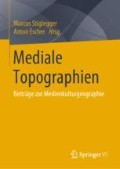Abstract
“Unchanged men in a changing land. Out of step, out of place and desperately out of time.”—so it says on the movie poster for Sam Peckinpah’s The Wild Bunch from 1969. The tagline is all the more poignant since it can and should be read on more than one level: It is not just the movie’s (anti-) heroes that have outlived their time but also the whole genre of the western, which may have become anachronistic in the late sixties. And finally, the movie’s very setting itself is—both geographically and temporally—on the edge.
Ere we reach the shining river,
Lay we every burden down;
[…]
Soon we’ll reach the silver river,
Soon our pilgrimage will cease;
Soon our happy hearts will quiver
With the melody of peace.
Robert Lowry, “Shall We Gather at the River”.
Access this chapter
Tax calculation will be finalised at checkout
Purchases are for personal use only
Notes
- 1.
In his interest for this radical aspect of the cinematic out-of-field Peckinpah is much akin to the European master of the off-screen: Michelangelo Antonioni. In fact, Peckinpah himself will cite Antonioni as a filmmaker, whose movies Deserto Rosso and Blow-Up he was particularly impressed by (see Farber 2008, p. 45). For a Lacanian reading of the off-screen space in Antonioni see (Binotto 2009).
- 2.
I have to thank Chris Lukinbeal and his sharp geographer’s eye for pointing this out to me.
- 3.
It is interesting to note that also The Wild Bunchʼs General Mapache drives an automobile, thus making clear how anachronistic the westerners on their horses have become.
References
Binotto, Johannes (2009): Hors-champ. Vom psychoanalytischen Feld am Rand des Films. RISS. Zeitschrift für Psychoanalyse, Heft 72/73 (II–III): Psychoanalyse und Film: 77–96.
Cutts, John (2008): Shoot! Sam Peckinpah Talks to John Cutts [1969]. In Kevin J. Hayes (Ed.): Sam Peckinpah Interviews. Jackson: University Press of Mississippi, 53–61.
Dell’Agnese, Elena (2005): The US-Mexico Border in American Movies: A Political Geography Perspective. Geopolitics 10: 204–221.
Deleuze, Gilles ([French 1983] 1986): Cinema 1: The Movement-Image. Trans. by Hugh Tomlinson und Barbara Habberjam. London: Athlone Press.
Evans, Dylan (1996): An Introductory Dictionary of Lacanian Psychoanalysis. London/New York: Routledge.
Farber, Stephen (2008): Peckinpahʼs Return [1969]. In Kevin J. Hayes (Ed.): Sam Peckinpah Interviews. Jackson: University Press of Mississippi, 29–45.
Foucault, Michel ([French 1984] 1986): Of Other Spaces. Trans. by Jay Miskowiec. Diacritics 16.1 (Spring): 22–27.
Freud, Sigmund (1946): Das Unbewusste [1915]. Gesammelte Werke X. Werke aus den Jahren 1913–1917. London: Imago, 263–303.
Grønstad, Asbjørn (2003): Gathering at the River: Ford, Peckinpah and the Failure of the Communal. American Studies in Scandinavia 35.1.: 51–67.
Kittler, Friedrich ([german 2002] 2010): Optical Media: Berlin Lectures 1999. Trans. by Anthony Enns. Cambridge: Polity Press.
Kitses, Jim (1998): Peckinpah Re-visited. Pat Garrett and Billy the Kid. In Jim Kitses and Gregg Rickman (Eds.): The Western Reader. New York: Limelight Editions, 223–243.
Lacan, Jacques ([1962–1963] 2004): Le séminaire. Livre X: L’angoisse. Ed. by Jacques-Alain Miller, Paris: Seuil. English translation by Cormac Gallagher from unedited French typescripts, http://www.lacaninireland.com/web/wp-content/uploads/2010/06/Seminar-X-Revised-by-Mary-Cherou-Lagreze.pdf.
Lacan, Jacques ([1964] 1978): The Seminar. Book XI. The Four Fundamental Concepts of Psychoanalysis. Trans. by Alan Sheridan, New York: W.W. Norton.
Laplanche, Jean and Jean-Bertrand Pontalis [French 1967] 2018: The Language of Psycho-Analysis. Trans. by Donald Nicholson-Smith, New York: Routledge.
Schrader, Paul (1994): Sam Peckinpah Going to Mexico. In Michael Bliss (Ed.): Doing It Right. The Best Criticism on Sam Peckinpah’s The Wild Bunch. Carbondale/Edwardsville: Southern Illinois University Press, 17–30.
Seydor, Paul (1980): Peckinpah: The Western Films. A Reconsideration. Urbana/Chicago: University of Illinois Press.
Slotkin, Richard ([1992] 1998): Gunfighter Nation. The Myth of the Frontier in Twentieth-Century America. Norman: University of Oklahoma Press.
Weddle, David (1994): “If They Move … Kill ’Em.!” The Life and Times of Sam Peckinpah. New York: Grove Press.
List of Films
The Wild Bunch – Sie kannten kein Gesetz. USA 1969. Direction: Sam Peckinpah.
Stagecoach. German Höllenfahrt nach Santa Fe. USA 1939. Direction: John Ford.
My Darling Clementine. German Faustrecht der Prärie. USA 1946. Direction: John Ford.
Ballad of Cable Hogue, German Abgerechnet wird zum Schluß. USA 1970. Direction: Sam Peckinpah.
The Getaway. USA 1972. Direction: Sam Peckinpah.
Author information
Authors and Affiliations
Corresponding author
Editor information
Editors and Affiliations
Rights and permissions
Copyright information
© 2019 Springer Fachmedien Wiesbaden GmbH, ein Teil von Springer Nature
About this chapter
Cite this chapter
Binotto, J. (2019). Crossing Another River: Border and Transgression in the Films of Sam Peckinpah. In: Stiglegger, M., Escher, A. (eds) Mediale Topographien. Springer VS, Wiesbaden. https://doi.org/10.1007/978-3-658-23008-1_6
Download citation
DOI: https://doi.org/10.1007/978-3-658-23008-1_6
Published:
Publisher Name: Springer VS, Wiesbaden
Print ISBN: 978-3-658-23007-4
Online ISBN: 978-3-658-23008-1
eBook Packages: Social Science and Law (German Language)

